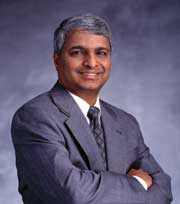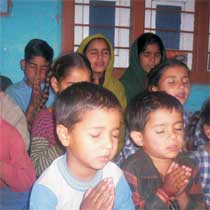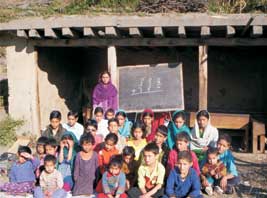No Child Left Behind – Indian Charity Organizations in USA
Author by Padmini Rao
One of India’s biggest gifts to the spiritual world, the great saint and philosopher Swami Vivekananda, once remarked, “Service to mankind is service to God.” He was of the opinion that God resides in the soul of every human being – taking care of the poor, ill and the distressed brings more virtue than going to temples, mosques and churches in search of God. Swamiji’s views and beliefs stand timeless and ageless even in the present day world of malice, violence and suspicion. Fortunately, there are certain people or groups of people who place supreme importance to this notion and carry out several benevolent work that make the world a better place to live in. A number of Indian charity organizations in the USA have engaged in the upliftment of the poor, distressed, ill and old men, women and children all over the world. In India too, we have several such bodies that are doing tremendous work in the social sector. While all the areas that need development and improvement are important for the betterment of society and the country, there is hardly any gainsay that the most critical among all of them are the children. In a country like India, there are millions of poor, underprivileged, undernourished, diseased children, who lose their life or way in search of a half meal or a simple medication. Children are no doubt, the main stay and future of any society and all Indian charity organizations that are working for changing the lives of these lesser children of God are no doubt doing a superb job.
Vivekananda, once remarked, “Service to mankind is service to God.” He was of the opinion that God resides in the soul of every human being – taking care of the poor, ill and the distressed brings more virtue than going to temples, mosques and churches in search of God. Swamiji’s views and beliefs stand timeless and ageless even in the present day world of malice, violence and suspicion. Fortunately, there are certain people or groups of people who place supreme importance to this notion and carry out several benevolent work that make the world a better place to live in. A number of Indian charity organizations in the USA have engaged in the upliftment of the poor, distressed, ill and old men, women and children all over the world. In India too, we have several such bodies that are doing tremendous work in the social sector. While all the areas that need development and improvement are important for the betterment of society and the country, there is hardly any gainsay that the most critical among all of them are the children. In a country like India, there are millions of poor, underprivileged, undernourished, diseased children, who lose their life or way in search of a half meal or a simple medication. Children are no doubt, the main stay and future of any society and all Indian charity organizations that are working for changing the lives of these lesser children of God are no doubt doing a superb job.
When we talk about children and charity organization the first name that comes to mind is the  name of Ekal Vidyalaya Foundation. It is a charitable trust that initiates, supports, and runs non-formal one-teacher schools (popularly known as Ekal Vidyalayas) all over the country. With the participation of numerous non-profit trusts and organizations, this program has now become the greatest non- govern mental education movement in India. The Ekal Vidyalaya movement aims to help eradicate illiteracy from rural and tribal India by 2011. Striding thick and fast in this direction, Ekal is a movement of over 26,719 teachers, 5,000 plus voluntary workers, 22 field organizations and 8 support agencies, and their activities crisscross about 22 Indian states as of 2009. With this tremendous human force, the Ekal Vidyalaya movement strives to create a network of non-formal schools that will educate and empower children in rural and tribal India. Moreover, Ekal Vidyalaya goes beyond mere literacy. Apart from its goal of achieving the national standards of Minimum Level of Learning (MLL) for its students, Ekal Vidyalaya also seeks to empower the village community for its own self-development. Ekal Vidyalaya solicits complete involvement of the local community and aims at making the school self-reliant in a period of five to seven years. Of course, this is possible because the Ekal Vidyalaya movement seeks the participation of local people in the creation of the school, the selection of the teacher, and the adaptation of the curriculum and schedule. With this munificent approach on educating the illiterate rural and tribal people of India, there is no doubt that Ekal is doing a commendable job.
name of Ekal Vidyalaya Foundation. It is a charitable trust that initiates, supports, and runs non-formal one-teacher schools (popularly known as Ekal Vidyalayas) all over the country. With the participation of numerous non-profit trusts and organizations, this program has now become the greatest non- govern mental education movement in India. The Ekal Vidyalaya movement aims to help eradicate illiteracy from rural and tribal India by 2011. Striding thick and fast in this direction, Ekal is a movement of over 26,719 teachers, 5,000 plus voluntary workers, 22 field organizations and 8 support agencies, and their activities crisscross about 22 Indian states as of 2009. With this tremendous human force, the Ekal Vidyalaya movement strives to create a network of non-formal schools that will educate and empower children in rural and tribal India. Moreover, Ekal Vidyalaya goes beyond mere literacy. Apart from its goal of achieving the national standards of Minimum Level of Learning (MLL) for its students, Ekal Vidyalaya also seeks to empower the village community for its own self-development. Ekal Vidyalaya solicits complete involvement of the local community and aims at making the school self-reliant in a period of five to seven years. Of course, this is possible because the Ekal Vidyalaya movement seeks the participation of local people in the creation of the school, the selection of the teacher, and the adaptation of the curriculum and schedule. With this munificent approach on educating the illiterate rural and tribal people of India, there is no doubt that Ekal is doing a commendable job.
Another organization is Pratham. Established in 1991, Pratham claims to be India’s largest charity organization working to provide quality education to the underprivileged children of India. Pratham firmly believes in working with the government to bring about large-scale change and therefore their programs are aimed at supplementing rather than replacing governmental efforts. The mission of Pratham’s programs are to (a) increase enrolment in schools; (b) Learning in schools and communities increases; (c) The education net reaches  children who are unable to attend school; and (d) Models are replicated and scaled up to serve large numbers of children to achieve a large scale impact. The Pratham team comprises of eminent members of the education, professional, corporate and government sector, who all bring their experiences and perspectives to the organization and are unified by the common vision of improving the future of the nation’s children. Pratham’s direct programs include imparting pre-school education; conducting learning support programs; building libraries and organizing the mainstreaming of out of school children. Currently the direct programs in most cities are being consolidated as Urban Learning Centres. However, the most prolific and flagship program of Pratham is the Read India program. Read India helps to improve the reading, writing and basic arithmetic skills of the children in the age group of 6-14 years. Read India seeks to catalyze existing resources and energize structures to strengthen children’s learning. Partnerships have been forged with 11 state governments for the implementation of the program. In 2008-09, the campaign reached 33 million children across 19 states. It covered 305,000 out of the 600,000 villages of India and mobilized 450,000 volunteers. Extending its activities across the national boundaries, Pratham has branches and chapters in other parts of the world too. Pratham USA, a non-profit organization, was established in 1999 to support Pratham’s critical work in India. It aims to raise awareness about the problem of illiteracy in India and raise funds in USA to support Pratham’s projects. It has active chapters in many cities of USA including New York, Houston, Los Angeles, San Francisco, and Washington DC.
children who are unable to attend school; and (d) Models are replicated and scaled up to serve large numbers of children to achieve a large scale impact. The Pratham team comprises of eminent members of the education, professional, corporate and government sector, who all bring their experiences and perspectives to the organization and are unified by the common vision of improving the future of the nation’s children. Pratham’s direct programs include imparting pre-school education; conducting learning support programs; building libraries and organizing the mainstreaming of out of school children. Currently the direct programs in most cities are being consolidated as Urban Learning Centres. However, the most prolific and flagship program of Pratham is the Read India program. Read India helps to improve the reading, writing and basic arithmetic skills of the children in the age group of 6-14 years. Read India seeks to catalyze existing resources and energize structures to strengthen children’s learning. Partnerships have been forged with 11 state governments for the implementation of the program. In 2008-09, the campaign reached 33 million children across 19 states. It covered 305,000 out of the 600,000 villages of India and mobilized 450,000 volunteers. Extending its activities across the national boundaries, Pratham has branches and chapters in other parts of the world too. Pratham USA, a non-profit organization, was established in 1999 to support Pratham’s critical work in India. It aims to raise awareness about the problem of illiteracy in India and raise funds in USA to support Pratham’s projects. It has active chapters in many cities of USA including New York, Houston, Los Angeles, San Francisco, and Washington DC.
Another Indian charity organization in the USA doing tremendous work in the field of child rights including education, is Child Rights & You (CRY). CRY has been working for the last three decades addressing problems related to child rights. Unlike other NGOs, that execute and implement projects for the target group, CRY mostly acts as the enabler. It brings together, on one hand develop-ment organizations and individuals working at grassroots-level with margina-lized children, their families and communities, and on the other, common people, coming together from all walks of life who believe in the rights of children. Its mission is to enable people to take responsibility for the situation of the deprived Indian child and motivate them to confront the situation through collective action thereby giving the  child and themselves an opportunity to realize their full potential. In the process, CRY harnesses the support, money, time, and skills of millions of Indians worldwide who could provide resources and thousands of dedicated fieldworkers across India struggling to function for lack of them. As a result of its sustained activities and movement, CRY has enabled communities in villages and slums across 18 states in India to work towards addressing the root causes of issues like deprivation, adult unemployment, exploitation and abuse – that constrain the rights of children. By mobilizing these communities CRY along with its partners have ensured over 1,500,000 children across India with opportunities they could not dream of. CRY’s programs include prioritizing grant making basis by identifying grassroot Indian charity organizations involved in addressing the key issues; capacity building in the areas of child rights, organization building, policy analysis and advocacy; community mobilization for the cause of child rights; and alliance and network building to facilitate the transfer of learning, build solidarity between partner organizations and influence policy to positively impact the situation of Indian children. CRY is also active in the US through its American chapters at CRY America. It was originated on the belief that children are citizens in their own right, entitled to the full spectrum of human rights. CRY America does not believe in charity. Nor does it run schools, orphanages or dispensaries. Instead it partners grassroots-level Indian charity organizations working with children, their parents and communities in India by acting as the link between the people in USA who want to help the underprivileged child and the child in need, wherever she might be, in India or the USA. CRY’s widespread work, which is to support projects that ensures basic rights to all categories of underprivileged children, including street children, girl children, children bonded in labor, children of commercial sex workers, physically and mentally challenged children and children in juvenile institutions, have been highly acknowledged and revered all along and made he life of the children much better than it were earlier.
child and themselves an opportunity to realize their full potential. In the process, CRY harnesses the support, money, time, and skills of millions of Indians worldwide who could provide resources and thousands of dedicated fieldworkers across India struggling to function for lack of them. As a result of its sustained activities and movement, CRY has enabled communities in villages and slums across 18 states in India to work towards addressing the root causes of issues like deprivation, adult unemployment, exploitation and abuse – that constrain the rights of children. By mobilizing these communities CRY along with its partners have ensured over 1,500,000 children across India with opportunities they could not dream of. CRY’s programs include prioritizing grant making basis by identifying grassroot Indian charity organizations involved in addressing the key issues; capacity building in the areas of child rights, organization building, policy analysis and advocacy; community mobilization for the cause of child rights; and alliance and network building to facilitate the transfer of learning, build solidarity between partner organizations and influence policy to positively impact the situation of Indian children. CRY is also active in the US through its American chapters at CRY America. It was originated on the belief that children are citizens in their own right, entitled to the full spectrum of human rights. CRY America does not believe in charity. Nor does it run schools, orphanages or dispensaries. Instead it partners grassroots-level Indian charity organizations working with children, their parents and communities in India by acting as the link between the people in USA who want to help the underprivileged child and the child in need, wherever she might be, in India or the USA. CRY’s widespread work, which is to support projects that ensures basic rights to all categories of underprivileged children, including street children, girl children, children bonded in labor, children of commercial sex workers, physically and mentally challenged children and children in juvenile institutions, have been highly acknowledged and revered all along and made he life of the children much better than it were earlier.
 While the above named organizations work in the field of child education and child rights, there is one more sector, which is equally important. It is about providing food and nourishment to the children, in other words, taking care of child health. Akshaya Patra, a charity organization formed in 2000 in Bangalore, caters to this problem area with an “unlimited food for education.” Akshaya Patra means ‘’inexhaustible vessel” from which unlimited food can be drawn. The origin behind the concept of Akshaya Patra is very noble. Every year, 2.5 million children die in India, of which more than half of these deaths could be prevented if children were well nourished. The proven path to helping the poor is by educating them. Providing food works as an important factor that encourages education. But then,
While the above named organizations work in the field of child education and child rights, there is one more sector, which is equally important. It is about providing food and nourishment to the children, in other words, taking care of child health. Akshaya Patra, a charity organization formed in 2000 in Bangalore, caters to this problem area with an “unlimited food for education.” Akshaya Patra means ‘’inexhaustible vessel” from which unlimited food can be drawn. The origin behind the concept of Akshaya Patra is very noble. Every year, 2.5 million children die in India, of which more than half of these deaths could be prevented if children were well nourished. The proven path to helping the poor is by educating them. Providing food works as an important factor that encourages education. But then,  a hungry child cannot be expected to have an urge for education. This charity organization focuses on this aspect with a vision to encourage education amongst the poor. Akshaya Patra is a unique and successful example of a Public Private Partnership (PPP) in the Mid Day Meal sector. In partnership with the Central and respective State Governments of India, the Akshaya Patra Foundation is the largest Mid Day Meal Program in the World. Akshaya Patra is a secular, not-for-profit program implemented only in government schools where there is no discrimination on the basis of religion, gender, color, or socio-economic background. It started as a pilot project in five schools in Bangalore, but has now grown into a mammoth endeavor reaching out to 10,08,518 children in 16
a hungry child cannot be expected to have an urge for education. This charity organization focuses on this aspect with a vision to encourage education amongst the poor. Akshaya Patra is a unique and successful example of a Public Private Partnership (PPP) in the Mid Day Meal sector. In partnership with the Central and respective State Governments of India, the Akshaya Patra Foundation is the largest Mid Day Meal Program in the World. Akshaya Patra is a secular, not-for-profit program implemented only in government schools where there is no discrimination on the basis of religion, gender, color, or socio-economic background. It started as a pilot project in five schools in Bangalore, but has now grown into a mammoth endeavor reaching out to 10,08,518 children in 16
locations across seven states. Akshaya Patra is now feeding one million children every day during the school year in various parts of India using two operational models for its kitchens: centralized and decentralized. The lunches prepared by Akshaya Patra are professionally managed, nutritionally balanced, hygienic, as well as tailored for regional diet preferences. Like most of the other Indian charity organizations in the US, Akshaya Patra too is dependent on charities and grants and is active in various parts of the world in an effort to accumulate grants and sponsorships for its valuable service to mankind. As a result of its efforts, it is a regular recipient of grants and sponsorships from global giants like Merrill Lynch, Deloitte, Yahoo and a host of other US and European organizations.
Swadvi Rhitambhara is a known name in the field of Indian politics – herself being an active proponent of Hindu movement, which has often landed her in controversies. But, an enterprise of this lady indeed commands respect and awe – through which she has been doing great service to the cause of poor and destitute children and women. Her Vatsalya Gram is primarily a home for orphaned children, destitute women, lonely grandmothers, and a community where maternal affection rules supreme. It is however not another orphanage or old home. Instead, it is a unique alternative to traditional orphanages and women’s shelters. It is the only facility in the world where orphaned children and destitute women of all ages are given homes so they may live like families and form everlasting bonds as parents and siblings. Vatsalya families live in an atmosphere of affection and are nurtured in a secure environment without any distinction of caste, creed or race. The concept takes birth from the belief that mother is the best guide for any children and for the orphaned children, they require some kind of motherly presence to charter their way in this world. As a result, the Vatsalya family consists of seven children, a mother, an aunt and a granny living in the familiar atmosphere of their own home. The women are carefully trained for their role in dealing with up to seven children per home. This arrangement encourages bonding within the family and gives the children a sense of belonging, both essential factors in the child’s early development. Vatsalya Gram provides a loving mother’s lap for the children and gives them the skills and support they need to reach their full potential. In the process, it also creates homes and families for the destitute women who will nurture and shower motherly love and build emotional bonds with the children entrusted to their care. These women now have a secure home, a life’s purpose and an opportunity to claim a family of their very own! Vatsalya Gram actually weaves a very closely bonded family out of the people who were otherwise lonely, aimless and might have gone lost in the whirls of the world.
This list of Indian charity organizations in the USA, who are absolutely dedicated to the uplifting of children in the spheres of food, education and child rights is not a short one. It was certainly not possible to include all or most of them in the short scope of this article, but the above was just an effort to update Indians in all parts of the world on the good deeds of these organizations and to come out in hordes in joining hands with these humanitarian organizations in making their beloved country’s future days bright – because after all, the children are the leaders of tomorrow’s India.
About the author
Padmini Rao lives in Atlanta and has been helping various charity organizations for the last 10 years. A mother of two children, Padmini cares a lot about children living in India. She has a Masters Degree in Social Welfare from University of Madras, Chennai, India.




















